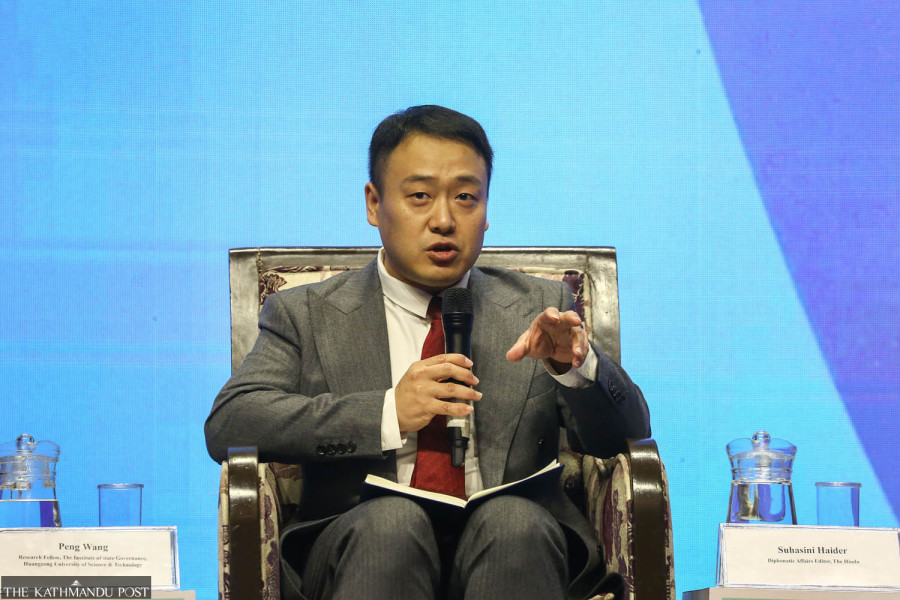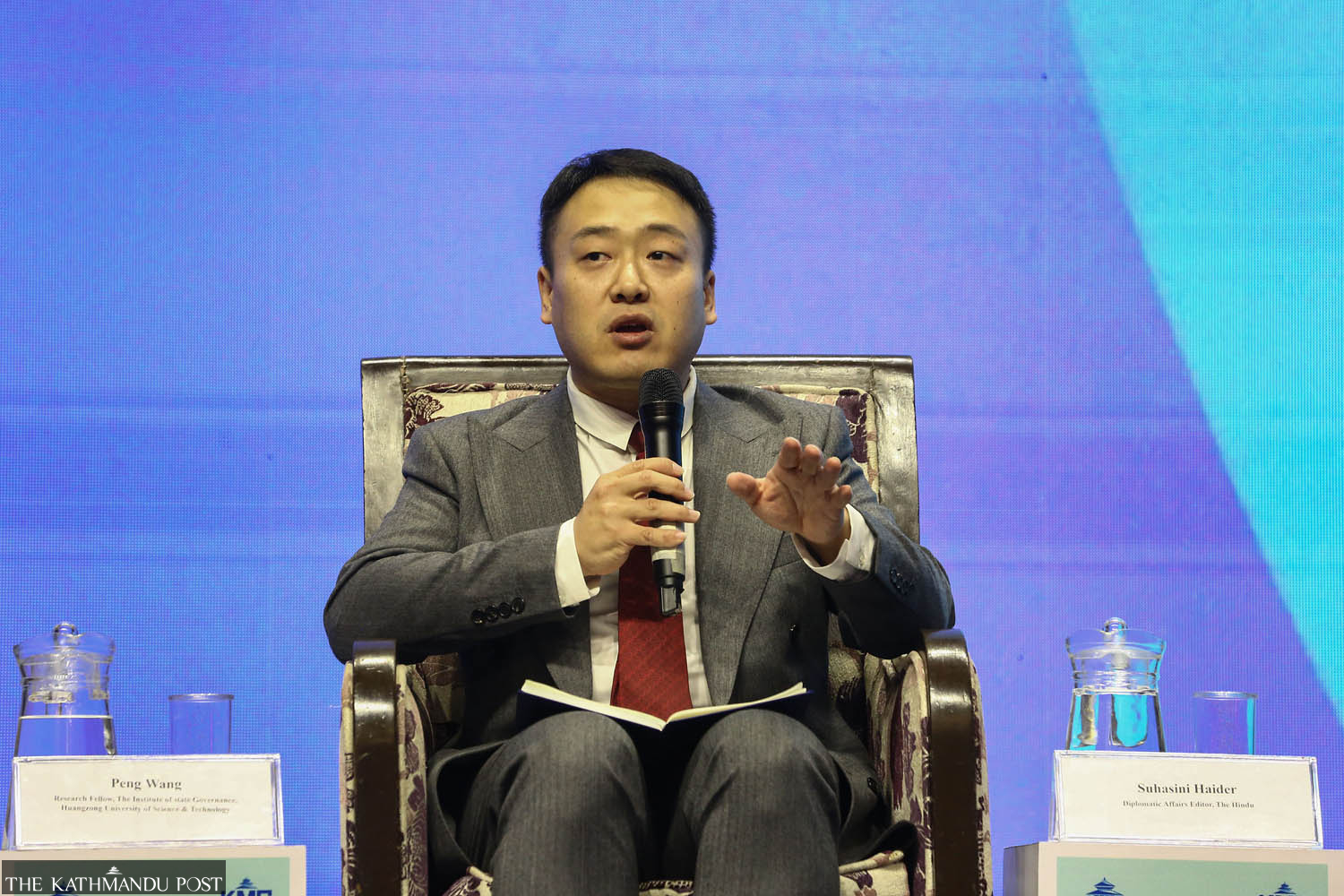Interviews
Rather than a bridge, Nepal should try to develop as a port
China and India are ancient civilisations. We can solve our problems together. We don’t need a third party.
Purushottam Poudel & Jagdishor Panday
Wang Peng, a research fellow from the Institute of State Governance at Huazhong University, Wuhan, was previously Deputy Secretary-General of the National Academy of Belt and Road Green Development (NABRGD) Beijing. Peng, a keen observer of South Asian geopolitics, was recently in Kathmandu to participate in ‘Kantipur Conclave-2024’. He sat down with the Post’s Purushottam Poudel and Kantipur’s Jagdishor Panday to discuss a host of issues. Excerpt:
How have Nepal-China relations evolved in recent times?
Generally, bilateral ties between Nepal and China have been stable. Politically, China’s Nepal policy has been stable too. Even though the administration in Nepal has changed, Kathmandu still has a stable and friendly policy towards China. Relations are progressing steadily. But we still have room for progress.
Nepal’s Prime Minister is visiting China in the first week of December. This is a perfect opportunity for the Nepali and Chinese governments to enhance mutual understanding and political trust. Face-to-face meetings between the leaders of two countries are crucial.
Due to the Himalayas, many Chinese people, including me, consider Nepal a country far away. But actually, we are alongside each other, not far. Nepal is an hour’s distance from Lasha and a few hours from Chengdu, which is very close.
Despite being a close neighbour, China is often accused of not investing enough in Nepal, at least as compared to its other neighbours. Why is this so?
There is no need to compare countries as every country has its own conditions. China’s investment in Nepal is significant, especially considering Nepal’s current economic size, population, and capability to use foreign capital effectively.
We may talk about the cooperation between China and Pakistan, with the China-Pakistan Economic Corridor (CPEC) as a flagship BRI program. China indeed has a massive investment in Pakistan. China has good relations with Pakistan for many reasons, one of them being that Pakistani politicians usually do not play the so-called “China card”. Despite political changes in Pakistan, relations between Beijing and Islamabad are seldom harmed.
China is equal to every partner within the BRI framework, so the key variable essentially is the local leaders’ political choices and their ability to build consensus in domestic politics.
What are you trying to suggest when you say Pakistan does not play China card?
Many Chinese International Relations scholars, including me, appreciate Pakistan. What we appreciate about Pakistan is that despite their internal political differences, there is a bottom line that none of them uses China as a card.
Because of this, Chinese companies dare to invest in Pakistan. This is good—good for these companies and good for the local guys—and this has created more than 10,000 jobs for the local guys over the past few years. In this way, China and Pakistan have accumulated a high level of strategic trust. Non-intervention has been the fundamental principle of Chinese foreign policy.
In most developing countries, the government often changes. The country’s people can change the government if they think it has done no good to the citizens. We only hope that politicians do not use China as weapons when fighting for power.
So the goal should be to devise a win-win plan to benefit both sides.
You mentioned China’s investment preferences abroad. But don’t you think that the investment decisions of a democratic government and an undemocratic one like China will be different?
China is a democratic country. People say that China is not a democratic country since it does not have an election. But the Chinese leaders are under intense pressure to think about history. The Chinese government and the leaders should work for the benefit of all the citizens of the country, not just for their supporters. For example, Donald Trump doesn’t need to serve all American people. Even if he supports the people who supported him during the election, his work is done. However, in China, this is not the case. The Chinese government should reconcile different peoples and encourage joint development of the country.
A country like China, which is big both in terms of people and land mass, will split if the government does not tread cautiously. That’s China’s nightmare. We have suffered many tragedies in history, so we don’t want this kind of thing to happen again.
The Chinese Communist Party, government and high-ranking leaders believe in history. That is why they try to create or design five-year institutions, projects, and reform plans.
For example, the Chinese still celebrate Deng Xiaoping’s legacy. Despite being the leader who was not elected, did Deng use power arbitrarily? No. He prudently used his power to ensure that even 50 years down the lane, the country’s people remember him as a leader who greatly benefitted them. Other Chinese political leaders have also taken responsibility for all Chinese people and have made significant reforms to create an environment for business, and for investment in new technology, such as AI and space technology.
How do you assess China’s relationship with South Asian countries in general?
We should not indulge in conflict. We need resolution and reconciliation with India in the border conflict. All the neighbouring countries, including Nepal, have no border conflict. Apart from India and Bhutan, China has no border conflict with our neighbouring countries.
Bhutan is happy to sign a border contract with China, but maybe they are waiting for the message from New Delhi. China will not exert any pressure. It is reasonable for China to be silent about other countries’ internal affairs. Sometimes, the decisions of neighbouring countries are not suitable for China’s interests, but China often keeps quiet and waits for good things to happen.
We don’t have any land ambition in our neighbouring countries; we have enough land. If so, why is there conflict in the South China Sea? We don’t have land ambition, so we don’t want an inch of land from other countries. At the same time, we are determined not to abandon an inch of our land.
If you look at the United Nations P-5 countries, which are permanent security council members, China is the most prudent country in which decisions are not made by weapons.
In South Asia, China-India relations have again started to improve. It's a good beginning. China's relations with other South Asian countries, including Nepal, are stable.
China and India are ancient civilisations. We have enough power to solve our problems together. We don’t need a third party’s long hand. We don’t need this kind of teaching. We are brothers; if we have problems, we can solve them together.
The best way to resolve the problem between China and India is to develop mutual political trust, security resolution, and economic cooperation, which I believe will happen. Thanks to the potential threat from Donald Trump’s reelection, the two leaders of China and India have used their political wisdom to make changes in advance and create a better atmosphere for the future.
Apart from security, what are China’s other concerns in Nepal?
The bottom line in China’s foreign policy with neighbouring countries is peace and stability. If you read the Chinese line, we admire mutual respect. We desire friendly countries to commit to ‘One China’. Second, China would also like to promote economic cooperation with Nepal. Not only with Nepal but also with all countries. We want a simple process of import and export, a good business environment, and transparency in law and policy. If the above-mentioned things are achieved, Chinese companies will dare to increase their investment [in Nepal].
Nepal has long been an adamant supporter of ‘One China policy’. But now it has also committed to uphold ‘One China principle’? What does this shift entail for Nepal?
To be precise, there is no difference. China’s bottom line is principle; for our friends, that’s policy. If they accept the One China principle, they will conduct a One China policy, which means they will not develop official contact with Taiwan.
Earlier in Nepal, there used to be a discourse that Nepal could be a bridge between India and China, but you have come up with a larger perspective that Nepal could not only be a door to South Asia but also to East Asia. Can you elaborate?
We don’t say Nepal or any other country should do this or that. We say we expect something. Frankly, China and India are both robust in population, land mass, and economies. Additionally, India is a young country. China also has its own advantage. Nepal has been blocked geographically by these two countries. But Nepal can potentially be the hub, not limited to the periphery.
At least in the next three decades, both China and India can offer the most attractive economic opportunities in the world. If Nepal treads cautiously, it can enjoy the benefit of its location. Geography is constant, but political geography is variable and changes.
If China and India go against each other, it might be a nightmare for the Nepali people. But, if China-India come together, even if not like in the 1950s, to make a rational decision not to let the border conflict escalate and promote trade, Nepal can enjoy its location as the intermediary rather than as a bridge.
Rather than a bridge, Nepal should be a port. In this way, Nepal can earn a lot with China and India because both countries should get permission from Nepal to use its ports to export and import the goods they want. Bring goods from China’s Tibet Autonomous Region to Nepal and then transit to India. Bring goods from Indian cities to Nepal and transit to China via Tibet Autonomous Region. It is a very short distance, and much better.

China is never envious of Nepal and India’s bilateral ties. We will never put sand in the wheels of Kathmandu-New Delhi relations. We know you are friends. But don’t make the friendship exclusive; it should be inclusive.
You mentioned that China does not meddle in the internal affairs of other countries. But China has tried to bring communist parties in Nepal together and has been holding ideological discussions with these parties. Isn’t this selective engagement a form of meddling?
First, one should know that in China, “international affairs” (among the governments of sovereign countries) are handled by the Ministry of Foreign Affairs (中华人民共和国外交部) under the central government, the same as in other countries. At the same time, “inter-party affairs” (between the CPC and all other friendly parties in the world) are handled by the International Department, Central Committee of CPC (中共中央对外联络部) within the Party system.
The mission of both the Ministry of Foreign Affairs and the International Department of the CPC Central Committee is to promote mutual understanding, friendship and cooperation between the Chinese government, the Communist Party of China and the Chinese people and governments, political parties and peoples of other countries, but the division of labor between the two is slightly different. There are some misreadings and misunderstandings.
First, it said that the International Department of the CPC only communicates with communist or left-wing parties. That is wrong. In fact, the International Department speaks on behalf of the Communist Party of China and all political parties around the world that are friendly to China, including both the ruling and opposition parties.
Second, it said that the International Department had contacts with opposition parties in other countries. This statement is also wrong. The International Department and the Ministry of Foreign Affairs have their own priorities. The ministry and the government agencies carry out diplomatic activities and naturally deal with the ruling parties of other countries.
However, the International Department of the CPC Central Committee conducts exchanges with all political parties that are friendly to China, in line with international norms and practices. Everything is above board and conducive to mutual understanding, mutual trust and win-win cooperation between the two governments, two parties and two peoples.
“Non-intervention in internal affairs” (不干涉他国内政) and “foreign affairs are not defined by ideology” (不以意识形态划线) are two major principles of the CPC and the Chinese government.
As Sun Yeli, spokesman for the 20th National Congress of the Communist Party of China (CPC) said on October 15, 2022, the CPC maintains different forms of contacts with more than 600 political parties and organisations in more than 170 countries, and the international circle of friends is growing.
“The more friends, the better.” As Sun Yeli said, for a long time, and on the basis of the principles of independence, complete equality, mutual respect and non-interference in each other's internal affairs, the Communist Party of China has had extensive exchanges with friendly political parties and political forces of other countries, and its international circle of friends has been growing.
In recent years, China has hosted the World Political Party Leaders Summit and high-level Dialogue, attended by more than 500 leaders of political parties and organisations from over 160 countries and more than 10,000 political party representatives. The development of political party relations has driven and promoted the development of state-to-state relations and enhanced the understanding and friendship between the peoples.
Sun Yeli said the CPC attaches importance to exchanges with Marxist political parties in other countries. Through theoretical exchanges and policy dialogue, they jointly explore the path of socialist development suitable for their respective national conditions and explore their respective paths to realise the localisation of Marxism.
“The CPC's foreign affairs are not defined by ideology,” Sun said, adding that the CPC is willing to make friends with all kinds of political parties of all countries, irrespective of the ideology they uphold, as long as they are friendly to China and willing to conduct exchanges with the CPC.
How is China seeing Nepal’s Prime Minister KP Sharma Oli’s Beijing visit, which will commence on December 2? Nepal’s prime minister, especially from the communist parties, often visits China. Big promises and agreements are made during the visits, but they seldom materialise. How hopeful is China about Prime Minister Oli’s visit this time?
I am not a foreign ministry official. So I cannot represent the Chinese government. Over the past decade, China-Nepal relations have made remarkable progress. Political mutual trust between the two sides has steadily increased, and economic cooperation has yielded initial results. There is an old saying in China, “haste makes waste.” In other words, whether it is to develop bilateral relations or the economy through economic and trade cooperation, these things must conform to the objective economic conditions and cannot be rushed. Steady improvement and steady progress are the best.




 19.12°C Kathmandu
19.12°C Kathmandu




.jpg&w=200&height=120)








